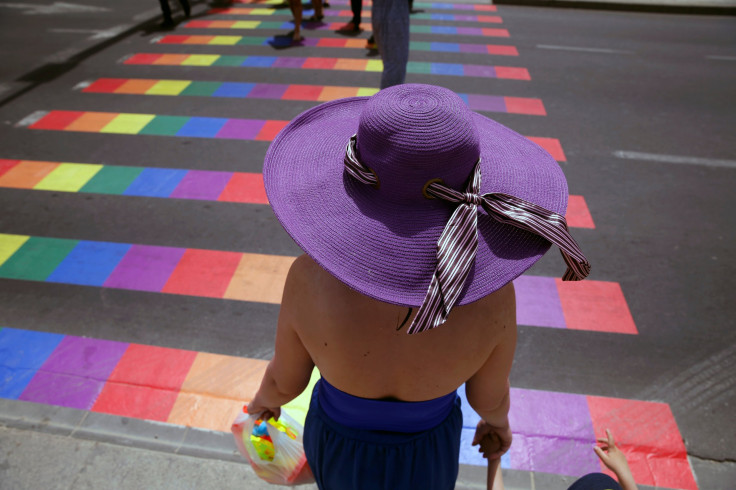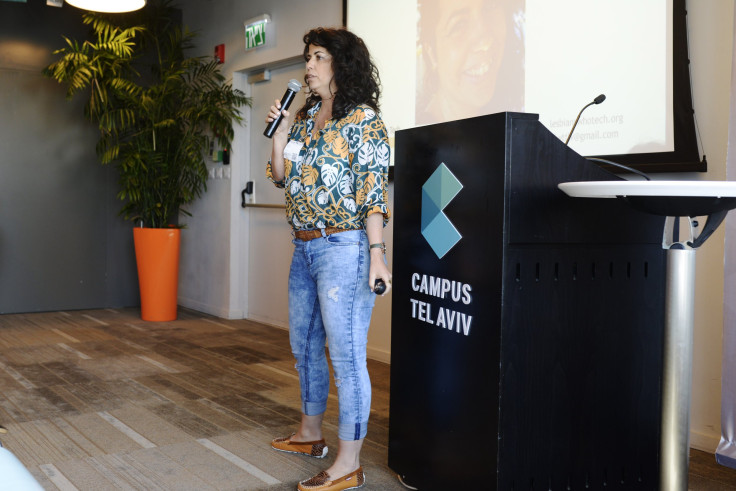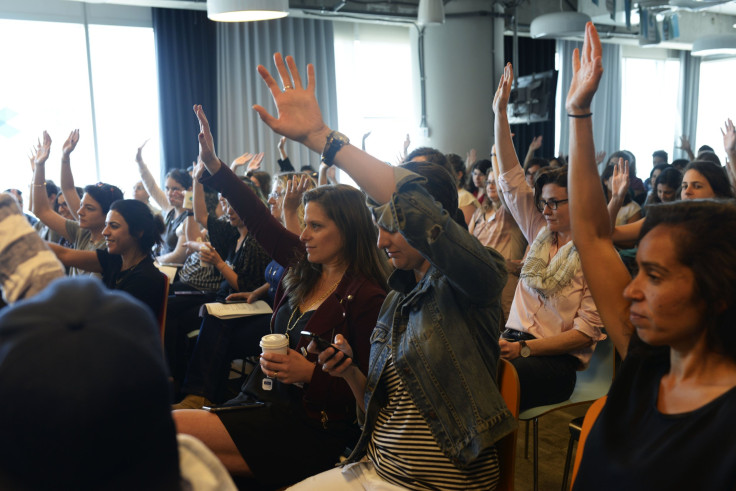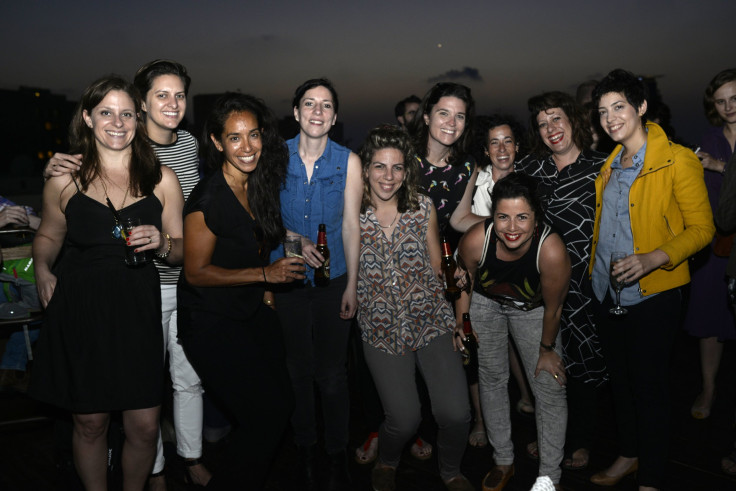Diversity, Pinkwashing And All Things High-Tech Are On The Agenda At ‘Lesbians Who Tech’ First Summit In Tel Aviv

TEL AVIV, Israel — For one week in June, Israel’s second city drums to a different beat: A mass of bronzed and oiled bodies descend on beachside bars and cafes festooned with rainbow flags, downing lunchtime mojitos to a soundtrack of pumping techno. This is Tel Aviv Gay Pride, the culmination of which is a traffic-stopping parade Friday that attracts some 200,000 people from around the world. Despite the predominance of muscled men on a rolling catwalk of ever smaller swim shorts, “Women in the Community” is the 2016 theme, and behind the scenes, it’s LGBT women who are really shaking things up.
Lesbians Who Tech combines two distinct yet quintessential facets of Tel Aviv life: a vibrant LGBT scene (voted the No. 1 gay city in a 2012 poll) and, with more high-tech startups per capita than any other country in the world, an established tech ecosystem. The pithily named organization “for queer women [working] in or around tech,” which started in a San Francisco bar three years ago, has since swelled to more than 16,000 global members in 35 cities. American founder Leanne Pittsford caught the industry’s attention with events such as #BringALesbianToWorkDay, and the group found its new eastern Mediterranean home in December. Six months later, LWT was holding its first Tel Aviv tech summit, bringing together lesbian women for a series of networking events and presentations in Google’s Tel Aviv offices.
In Israel, as in the United States, women are underrepresented in the fields of science and hi-tech. According to Israel's Central Bureau of Statistics, women constituted just over a third of employees in the country's hi-tech sector in 2014, including positions in marketing and sales. If the fields are narrowed down to mathematics, statistics, computer science and engineering, women are only a quarter of the workforce, CBS data released in March 2015 reveals, comparable to the 26 percent of computing jobs that are held by women in the U.S.
In her opening remarks to the assembled crowd, Pittsford said she wanted the event “to be a tech conference first” — but the all-female surroundings made for a distinctive atmosphere, one that participants relished, Sivan Kaniel, one of the summit’s organizers, and a trip manager for AirBnB in Dublin, Ireland, told International Business Times. “In most tech conferences, women are in the minority. Even at LGBT events, women are usually outnumbered by men. [Conferences like this] provide an opportunity for empowering women, something I’m passionate about.”

Kaniel’s enthusiasm was echoed by the other participants, who regularly broke into whoops of joy and applause throughout the presentations. One of the participants, a trans lesbian woman with her own software company, explained why: “It’s the first time I’ve gone to a tech event and trans women have got a mention. It’s the best experience I’ve had coming out. Everyone has treated me as they would any other woman.” For this software developer, who asked to remain anonymous in fear of jeopardizing future job prospects, the conference gave her — and the other women present — a rare opportunity to speak out in a safe space without fear or judgment. Here, on the artfully relaxed Google campus, the minority was now the outspoken majority.
LGBT women are not the only minority struggling to make their presence felt in Israel’s high-tech sector. Palestinian citizens of Israel make up just 1.3 percent of Israel’s high-tech workforce and less than half a percentage of all workers in the sector are Palestinian-Israeli women.

Yamama Dagesh is one of them. The 26-year-old, who grew up in a Muslim family in a small village among the green Galilean hills of northern Israel, is now a programmer for a small startup in Tel Aviv. Dagesh’s current workplace is supportive and diverse, but she admits that being “a minority in a minority” hasn’t always been easy. “When I told my mom I wanted to study computer science, she said, ‘That’s for men.’”
Moreover, her Jewish-Israeli male peers have, at times, made her job more difficult. “[At my previous company] I was the only woman and I was always reminded of it by my male colleagues. They always looked at me as ‘the Arab girl.’” A particularly awkward moment ensued two summers ago during Israel’s seven-week offensive in Gaza. “The sirens went off and we rushed to the bomb shelter. One of the other workers started talking about the rockets from Hamas and apologized to me. I told him, ‘Those rockets are nothing to do with me.’”
The many schisms in Israeli society — religion, ethnicity, politics, class, race and gender — are only too evident to the Lesbians Who Tech leaders in Tel Aviv. They are all Jewish Israelis, but they recognize the problems peculiar to this small Middle Eastern state: “In Israel, we don’t have a major black community. We have an Ethiopian [Jewish] population [who are underrepresented in tech] and that’s it. [Likewise] not so many Arab women are in tech or out [as LGBT] and those who are may not want to take part in an Israeli-centered event,” said Anat Nir, head of marketing for the LGBT social networking app Mooz.
U.S. founder Pittsford plans to address these challenges at future LWT events: "Did we have goals of creating a summit experience inclusive of innovators of all identities, including Palestinian women? Yes. Were we unsuccessful? Yes. But we learned more than we could imagine...Our summit in Tel Aviv [is] just the beginning."

All the participants that IBT spoke to were sensitive to charges of “pinkwashing,” the charge by opponents of Israeli policy that the state exploits gay life to cover up crimes of occupation and discrimination against Palestinians.
Michal Chorev, an IBM researcher, was emphatic that LGBT women need to lead the way to overcome prejudice in every sphere. Along with four other women working in tech, she has set up an organization called Code Goddess, designed to encourage more women, particularly those from minority backgrounds, to enter the fields of technology and science.
“I want to believe that minorities are more sensitive to other minorities, although I realize this isn’t always the case.”
Whatever group or subgroup one belongs to, Israeli or Palestinian, male or female, straight or queer, the heart of the issue, she says, is ignorance. “People from [Jewish-majority] Tel Aviv don’t speak to people from [mostly Arab] Jaffa. You can’t keep telling stories about someone you’ve never met.”
Her hope, along with those expressed at the summit, is that when the women leave and go back to their jobs and their communities, they will act as an example for others.
“What’s the alternative?”
© Copyright IBTimes 2024. All rights reserved.






















